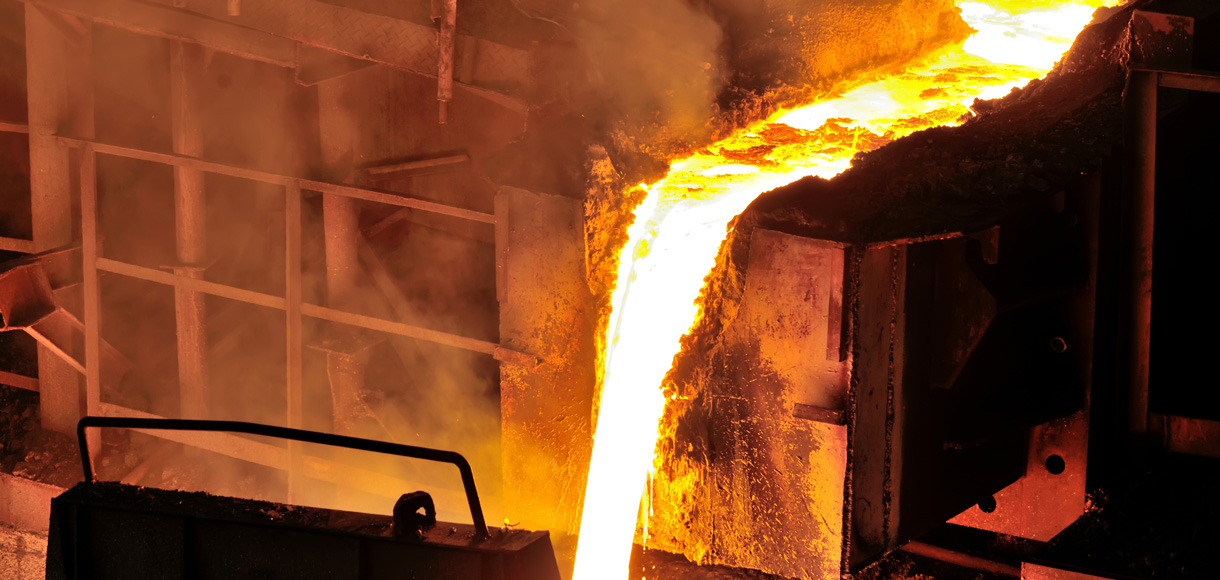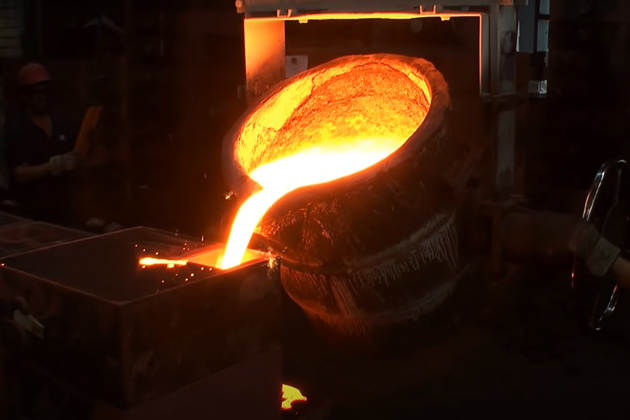Leading processes that define successful Metal Casting results
Wiki Article
Just How a Metal Foundry Adds To Sustainable Metal Manufacturing Practices
Metal foundries play an essential function in advertising sustainability within the metal manufacturing industry. By integrating recycled products, they decrease reliance on virgin resources and minimize ecological effects. Energy-efficient melting procedures even more decrease power usage and emissions. The journey toward lasting methods entails even more than simply reusing and power management. It encompasses a more comprehensive commitment to moral sourcing and ingenious technologies. The implications of these techniques are substantial and warrant more detailed assessment.The Role of Recycling in Metal Foundries
While metal production has actually traditionally relied upon virgin products, the increasing focus on sustainability has actually resulted in a substantial change in practices, especially in metal foundries. Recycling has actually become an essential element of this transformation, permitting foundries to repurpose scrap metal and lower reliance on extracted sources. By integrating recycled products right into their processes, foundries not just decrease environmental effect but additionally lower production expenses.Using recycled steels, such as aluminum, copper, and steel, lessens energy usage and lowers greenhouse gas exhausts connected with typical mining and refining approaches. Foundries can achieve high-quality outcomes by utilizing advanced sorting and handling innovations to guarantee the purity of recycled materials. This emphasis on recycling fosters a circular economic situation, where waste is minimized, and sources are made use of efficiently. Subsequently, metal foundries play an essential role in advertising sustainable techniques within the metal manufacturing sector.
Energy-Efficient Melting Strategies
Energy-efficient melting techniques are essential for boosting sustainability in metal manufacturing. These strategies significantly lower power intake throughout the melting procedure, which is among one of the most energy-intensive stages in metal production. Technologies such as induction melting, resistance home heating, and microwave melting offer boosted efficiency compared to standard methods. Induction melting, as an example, utilizes electro-magnetic fields to generate warm straight within the metal, minimizing energy loss and supplying specific temperature control.Additionally, implementing warmth healing systems can even more enhance efficiency by catching and reusing waste warmth produced throughout melting. Employing sophisticated insulation materials and maximizing furnace layouts additionally add to energy cost savings. By taking on these innovative melting techniques, metal foundries can decrease their carbon impact, decrease operational prices, and contribute to a much more sustainable production landscape. The combination of energy-efficient techniques not only lines up with environmental objectives however also fulfills the expanding demand for accountable manufacturing approaches in the metal market.
Lasting Sourcing of Raw Products
Lasting sourcing of raw materials is essential for minimizing the ecological impact of metal production. This includes the raised application of recycled steels, the fostering of honest mining techniques, and initiatives focused on neighborhood sourcing. By focusing on these techniques, the industry can promote liable resource monitoring and assistance regional economies.
Recycled Metal Utilization
How can industries efficiently minimize their environmental effect while fulfilling the expanding need for metal? One considerable technique is the application of recycled metal. By including scrap metal into their manufacturing procedures, foundries can decrease the removal of virgin products, therefore reducing and saving all-natural resources power intake. Recycled metals need less power to procedure contrasted to their raw equivalents, causing lower greenhouse gas exhausts. In addition, the usage of recycled metal helps draw away waste from landfills, promoting a round economic situation. Industries that prioritize recycled metal not just add to sustainability yet also gain from expense savings connected with minimized product procurement. Recycled metal usage stands as a necessary method for eco responsible metal manufacturing.Moral Mining Practices
While the demand for metals continues to climb, sectors are significantly identifying the relevance of moral mining methods in making certain liable sourcing of raw materials. Moral mining incorporates a dedication to ecological stewardship, social duty, and adherence to fair labor practices. Business are currently focusing on partnerships with mines that show openness in their operations, minimizing eco-friendly influence and appreciating local communities. This method not just promotes a lasting supply chain however also improves the track record of companies entailed. By applying rigorous criteria and certifications, industries can combat illegal mining activities and advertise the well-being of workers. Eventually, moral mining methods add substantially to a much more sustainable metal manufacturing environment, lining up financial development with ecological and social integrity.Local Sourcing Efforts

Innovations in Metal Casting Processes
Technologies in metal casting procedures are changing the industry by integrating advanced recycling strategies that reduce waste. Energy-efficient melting methods are likewise being established to lower energy usage throughout manufacturing. In addition, using cutting-edge mold products contributes to improved efficiency and sustainability in casting operations.Advanced Recycling Techniques
Advanced recycling strategies are transforming metal casting procedures, substantially boosting sustainability in the market. These technologies concentrate on reprocessing and redeeming scrap metal, substantially lowering waste and the need for virgin materials. Techniques such as hydrometallurgy and pyrometallurgy allow foundries to extract important steels from made use of components, making sure reliable source use. In addition, advanced sorting and purification innovations improve the quality of recycled steels, making them appropriate for high-performance applications. investigate this site This not only reduces the ecological impact of metal manufacturing yet additionally fosters a round economic climate by advertising the reuse of products. As these recycling methods remain to advance, they promise to further enhance operations within foundries and add to an extra lasting metal production landscape.Energy-Efficient Melting Methods
While traditional melting approaches have actually long been the backbone of metal casting, current developments have introduced energy-efficient strategies that markedly lower energy intake and emissions. Technologies such as induction melting and electric arc heating systems have gained importance, enabling accurate control over temperature and reducing the need for fossil fuels. These techniques not only enhance power performance however likewise advertise quicker melting times, which translates to lower operational prices. In addition, technologies in heat recovery systems allow foundries to catch and recycle excess warmth created throughout the melting process. This alternative approach to power monitoring not only supports lasting techniques however likewise settings metal foundries as leaders in the change in the direction of greener manufacturing procedures, further straightening with international sustainability objectives.Cutting-edge Mold Materials
As the need for more lasting and effective metal casting processes grows, helpful site the exploration of innovative mold and mildew materials has ended up being a focal factor in the market. Standard mold and mildew products usually add to environmental difficulties, triggering the search for alternatives that decrease waste and energy usage. Recent developments include the development of recyclable compounds and naturally degradable binders, which not only improve mold efficiency but additionally reduce environmental influence. Furthermore, the use of 3D printing technology in mold and mildew production permits detailed designs that minimize material usage and allow fast prototyping. These cutting-edge materials not only boost casting precision yet additionally align with sustainability goals, showcasing the market's dedication to minimizing its carbon footprint while keeping top notch production criteria.Minimizing Waste Through Advanced Modern Technology
Ingenious modern technologies are changing the metal production market by substantially reducing waste and improving performance. Advanced data analytics and artificial intelligence algorithms enable foundries to enhance manufacturing procedures, determining ineffectiveness and minimizing scrap material. Smart sensors keep an eye on devices efficiency in real-time, permitting anticipating upkeep that decreases downtime and waste generation. Furthermore, additive manufacturing methods, such as 3D printing, enable the development of facility components with very little material use, noticeably lowering waste contrasted to standard techniques.
Additionally, closed-loop systems this page are ending up being more widespread, where scrap metal and byproducts are recycled back right into the manufacturing cycle, making sure that products are utilized to their maximum potential - Aluminum Foundry. This assimilation of innovation not only advertises source conservation but likewise enhances the overall sustainability of metal manufacturing methods. By accepting these developments, foundries can add to an extra lasting future while maintaining competition in the marketplace
The Effect of Foundries on Carbon Footprint Reduction
Foundries play an essential duty in reducing the carbon impact of the metal manufacturing industry by executing various lasting techniques. By using energy-efficient technologies, such as electric arc furnaces, these facilities considerably reduced greenhouse gas discharges contrasted to conventional methods. In addition, foundries increasingly take on renewable power sources, which likewise reduces their dependence on fossil fuels.Reusing scrap metal is another essential practice that foundries utilize, preserving resources and minimizing the need for virgin materials. This not just minimizes waste however additionally cuts down on the energy-intensive extraction processes connected with mining. The adoption of closed-loop water systems helps to reduce water usage and minimize wastewater discharge, adding to an extra lasting operation.
Through these efforts, foundries show their dedication to ecological stewardship, causing a significant decrease in the total carbon footprint of the metal production industry. Their continuous initiatives are essential in the change towards an extra sustainable industrial landscape.
Frequently Asked Concerns
What Sorts of Metals Are A Lot Of Generally Recycled in Foundries?
Light weight aluminum, brass, steel, and copper are amongst one of the most generally recycled steels in foundries. These steels are preferred because of their high recycling prices, economic value, and widespread availability, adding greatly to commercial sustainability initiatives.Just How Do Foundries Make Certain the Top Quality of Recycled Products?
Foundries determine the quality of recycled materials through rigorous screening, sorting, and purification procedures. They apply advanced technologies to assess structure and eliminate pollutants, ensuring that the recycled metals meet market standards for performance and security.
What Qualifications Exist for Sustainable Foundry Practices?
Various accreditations exist for sustainable foundry techniques, consisting of ISO 14001 for environmental monitoring, ISO 50001 for power management, and LEED qualification for lasting structure methods (Metal Foundry). These certifications aid ensure adherence to environmental and sustainability criteria in operationsJust How Do Foundries Determine Their Carbon Impact Reduction?
Foundries gauge carbon impact reduction with tools like lifecycle analyses, power audits, and discharges tracking systems. They contrast baseline discharges to present outcomes, assessing improvements in energy effectiveness, product usage, and eco-friendly power fostering with time.What Are the Economic Benefits of Sustainable Metal Production?
Sustainable metal manufacturing uses financial advantages such as decreased functional prices, boosted performance, enhanced market competition, and prospective federal government motivations. Furthermore, it promotes advancement and draws in environmentally conscious customers, inevitably driving long-lasting success for services.Metal foundries play a necessary function in advertising sustainability within the metal manufacturing sector. While metal manufacturing has actually typically depended on virgin materials, the increasing emphasis on sustainability has actually led to a substantial shift in techniques, particularly in metal foundries. By including scrap metal right into their manufacturing processes, foundries can lower the removal of virgin products, consequently decreasing and preserving all-natural sources power consumption. Foundries play a crucial role in lowering the carbon footprint of the metal manufacturing sector by implementing different lasting techniques. Recycling scrap metal is an additional important method that foundries utilize, conserving sources and minimizing the demand for virgin products.
Report this wiki page